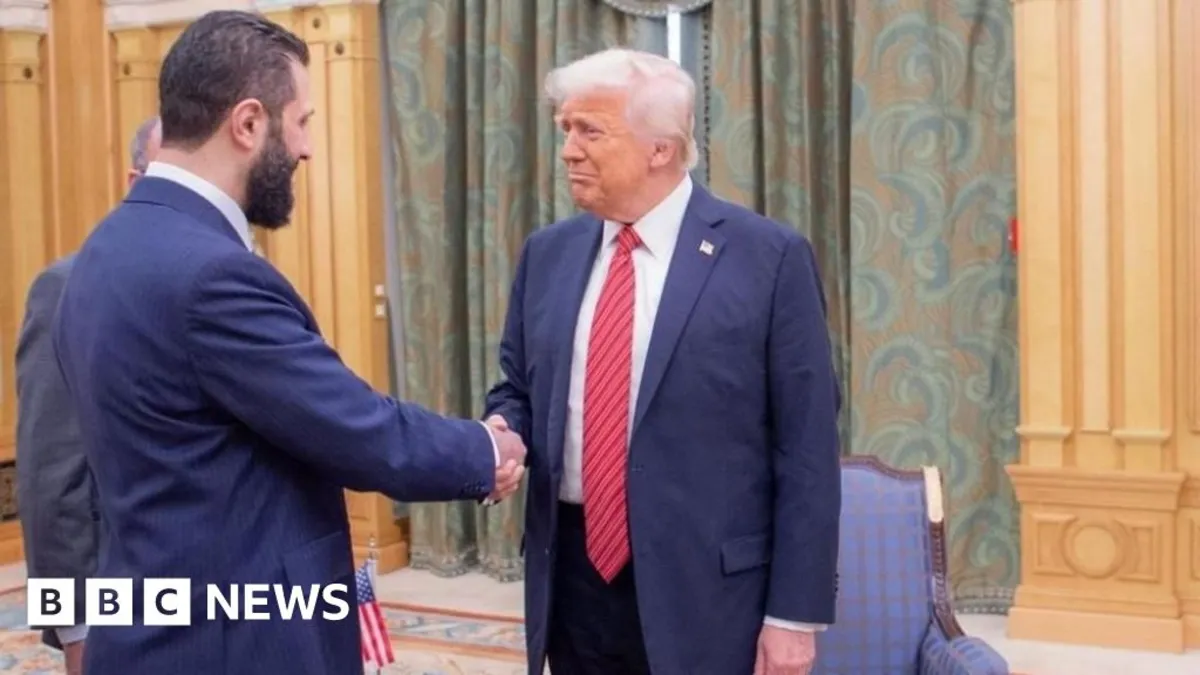
In a stunning development, Donald Trump has announced that his administration is exploring the possibility of normalizing relations with Syria. This statement comes shortly after a significant meeting with Syria's interim President, Ahmed al-Sharaa, whose forces played a pivotal role in ending the decades-long dictatorship of the Assad family. The meeting, which took place in Riyadh, was brief yet impactful, marking a shift in US foreign policy that seemed unthinkable just months ago.
Trump's 37-minute meeting with al-Sharaa, a former Syrian fighter once linked to Al-Qaeda, was notable not only for its content but also for the context. The $10 million bounty on al-Sharaa’s head was lifted only last December. Video footage from the encounter, held in a lavish Saudi royal palace, showed an initial awkwardness as the two leaders communicated through a translator. The Saudi Crown Prince, Mohammad bin Salman, was present, along with Turkish President Recep Tayyip Erdogan, who joined via telephone.
During the meeting, Trump acknowledged that the two leaders had a significant influence on his decision to lift the harsh US sanctions on Syria. His announcement at a major US-Saudi investment forum in Riyadh received a standing ovation, marking a dramatic turnaround from his previous statements indicating a lack of interest in Syria.
Trump described al-Sharaa as a “tough guy” with a strong past, glossing over his previous affiliations with al-Qaeda and the Hayat Tahrir al-Sham (HTS) group, which was al-Qaeda's affiliate in Syria until al-Sharaa severed ties in 2016. While HTS remains designated as a terrorist organization by the UN, US, and UK, al-Sharaa has adopted a Western business persona since taking office in December. This change aims to position him as a unifying figure for all Syrians.
Hind Kabawat, the minister of social affairs and labor in the interim government, expressed optimism about the potential for sanctions relief, stating, “It’s a new light at the end of this tunnel.” The lifting of sanctions could lead to improved living conditions for the 90% of Syrians currently living in poverty, after more than a decade of civil conflict.
Removing the restrictions that have isolated Syria from the international financial system could enable increased engagement from aid agencies and stimulate foreign investment and trade. A hotel receptionist in Damascus lamented the severe shortages faced by the country, illustrating the dire economic situation. The prospect of sanctions relief may also encourage the millions of Syrians in exile to consider returning home, as it could provide the interim government with the financial means to pay salaries and initiate reconstruction efforts.
However, the path to dismantling the extensive sanctions on Syria will not be straightforward. While some restrictions could be lifted using presidential waivers, the multi-layered sanctions require a genuine commitment from the Trump administration. As Dina Esfandiary of Bloomberg Economics notes, easing sanctions is a complex process that demands careful navigation.
Regional powers such as Saudi Arabia and Turkey are positioning themselves to influence the future of Syria, emphasizing the importance of keeping the Trump administration engaged in the normalization process. Trump has made it clear that he expects reciprocal actions, with one of his primary conditions being that Syria joins the Abraham Accords.
The Abraham Accords, a series of agreements aimed at normalizing relations between Israel and several Arab states, are regarded by Trump as a significant foreign policy achievement. Al-Sharaa has indicated a willingness to establish ties with Israel under favorable conditions, signaling a pragmatic approach despite ongoing Israeli military actions targeting what they describe as terrorist threats in Syria.
As the situation unfolds, the demands placed on al-Sharaa by Washington include the removal of foreign fighters from Syria, presenting yet another challenge for the new leadership. Trump has framed this moment as an opportunity for greatness, while millions of Syrians hold onto hope for a genuine improvement in their living conditions.